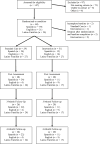Parent Training and Skill Acquisition and Utilization Among Spanish- and English-Speaking Latino Families
- PMID: 29456439
- PMCID: PMC5813840
- DOI: 10.1007/s10826-017-0881-7
Parent Training and Skill Acquisition and Utilization Among Spanish- and English-Speaking Latino Families
Abstract
In the U.S., there is a growing Latino population, in which parents primarily speak Spanish to their children. Despite the evidence that language preference is associated with level of acculturation and influences parenting practices in these families, no study has compared how Spanish-and English-speaking Latino families acquire and utilize the skills taught during parent-training programs such as Parent-Child Interaction Therapy (PCIT). Twenty-seven mother-infant Latino dyads received a home-based adaptation of the Child-Directed Interaction (CDI) phase of PCIT as part of a larger randomized control trial. Most infants were male (63%), and their average age was 13.7 months (SD = 1.43). Most families (52%) lived below the poverty line. The Dyadic Parent-Child Interaction Coding System-Third Edition (DPICS-III) was employed to evaluate PCIT skills at baseline and post-treatment, as well as at 3- and 6-month follow-up, assessments. We conducted multiple linear regression analyses among Spanish-speaking (55%) and English-speaking (45%) families to examine differences in acquisition and utilization of do and don't skills at each assessment while controlling for mother's education. Results yielded no group differences in the acquisition rate of do or don't skills at any time point. However, Spanish-speaking mothers used significantly more don't skills than English-speaking mothers at each assessment. Specifically, Spanish-speaking families used significantly more commands at baseline, post-treatment, and the 6-month followup assessments, as well as more questions at post-treatment and at the 6-month follow-up assessments. These findings highlight the importance of addressing cultural values such as respeto to ensure culturally robust parent-training programs for Latino families.
Keywords: Cultural adaptation; Latino; Mastery criteria; PCIT; Parent training.
Conflict of interest statement
Conflict of Interest The authors declare that they have no competing interests.
Figures
Similar articles
-
Trajectories of Change in Parent-Child Interaction Therapy Outcomes in Latinx Families: Implications for Cultural Adaptation.J Clin Child Adolesc Psychol. 2024 Sep 17:1-15. doi: 10.1080/15374416.2024.2395272. Online ahead of print. J Clin Child Adolesc Psychol. 2024. PMID: 39287980
-
Effectiveness of Parent-Child Interaction Therapy (PCIT) in the Treatment of Young Children's Behavior Problems. A Randomized Controlled Study.PLoS One. 2016 Sep 13;11(9):e0159845. doi: 10.1371/journal.pone.0159845. eCollection 2016. PLoS One. 2016. PMID: 27622458 Free PMC article. Clinical Trial.
-
Examining English- and Spanish-Speaking Therapist Behaviors in Parent-Child Interaction Therapy.Int J Environ Res Public Health. 2022 Apr 8;19(8):4474. doi: 10.3390/ijerph19084474. Int J Environ Res Public Health. 2022. PMID: 35457342 Free PMC article.
-
[Parent-child interaction therapy (PCIT)].Z Kinder Jugendpsychiatr Psychother. 2016 Nov;44(6):455-465. doi: 10.1024/1422-4917/a000453. Epub 2016 Jun 29. Z Kinder Jugendpsychiatr Psychother. 2016. PMID: 27356675 Review. German.
-
Cultural Adaptation of Group Parenting Programs: Review of the Literature and Recommendations for Best Practices.Fam Process. 2021 Dec;60(4):1134-1151. doi: 10.1111/famp.12658. Epub 2021 Apr 28. Fam Process. 2021. PMID: 33908027 Free PMC article.
Cited by
-
Developing and evaluating a lay health worker delivered implementation intervention to decrease engagement disparities in behavioural parent training: a mixed methods study protocol.BMJ Open. 2019 Jul 18;9(7):e028988. doi: 10.1136/bmjopen-2019-028988. BMJ Open. 2019. PMID: 31324682 Free PMC article.
-
Effect of Therapist Coaching Statements on Parenting Skills in a Brief Parenting Intervention for Infants.Behav Modif. 2022 Jul;46(4):691-705. doi: 10.1177/0145445520988140. Epub 2021 Jan 15. Behav Modif. 2022. PMID: 33448233 Free PMC article.
-
Behavioral Parent Training in Infancy: What About the Parent-Infant Relationship?J Clin Child Adolesc Psychol. 2018;47(sup1):S341-S353. doi: 10.1080/15374416.2017.1310045. Epub 2017 Apr 17. J Clin Child Adolesc Psychol. 2018. PMID: 28414546 Free PMC article. Clinical Trial.
-
A Pilot Trial of a Home-Based Parenting Intervention for High-Risk Infants: Effects on and Moderating Role of Effortful Control.Behav Ther. 2024 Jan;55(1):42-54. doi: 10.1016/j.beth.2023.05.003. Epub 2023 May 24. Behav Ther. 2024. PMID: 38216236 Free PMC article. Clinical Trial.
-
A Natural Helper Intervention to Address Disparities in Parent Child-Interaction Therapy: A Randomized Pilot Study.J Clin Child Adolesc Psychol. 2023 May-Jun;52(3):343-359. doi: 10.1080/15374416.2022.2148255. Epub 2022 Dec 16. J Clin Child Adolesc Psychol. 2023. PMID: 36524764 Free PMC article. Clinical Trial.
References
-
- Abrahamse ME, Junger M, Chavannes EL, Coelman FJ, Boer F, Lindauer RJ. Parent-child interaction therapy for preschool children with disruptive behavior problems in the Netherlands. Child and Adolescent Psychiatry and Mental Health. 2012;6:1–9. https://doi.org/10.1186/1753-2000-6-24. - DOI - PMC - PubMed
-
- Alegría M, Canino G, Shrout PE, Woo M, Duan N, Vila D, Meng XL. Prevalence of mental illness in immigrant and non-immigrant U.S. Latino groups. American Journal of Psychiatry. 2008;165:359–369. https://doi.org/10.1176/appi.ajp.2007.07040704. - DOI - PMC - PubMed
-
- Bagner DM, Coxe S, Hungerford GM, García D, Barroso NE, Hernández J, Rosa-Olivares J. Behavioral parent training in infancy: A window of opportunity for high-risk families. Journal of Abnormal Child Psychology. 2016;44:901–912. https://doi.org/10.1007/s10802-015-0089-5. - DOI - PMC - PubMed
-
- Bagner DM, Eyberg SM. Parent-child interaction therapy for disruptive behavior in children with mental retardation: A randomized controlled trial. Journal of Clinical Child and Adolescent Psychology. 2007;36:418–429. https://doi.org/10.1080/15374410701448448. - DOI - PubMed
-
- Bagner DM, Rodríguez GM, Blake CA, Linares D, Carter AS. Assessment of behavioral and emotional problems in infancy: A systematic review. Clinical Child and Family Psychology Review. 2012;15:113–128. https://doi.org/10.1007/s10567-012-0110-2. - DOI - PMC - PubMed
Grants and funding
LinkOut - more resources
Full Text Sources
Other Literature Sources
Medical


